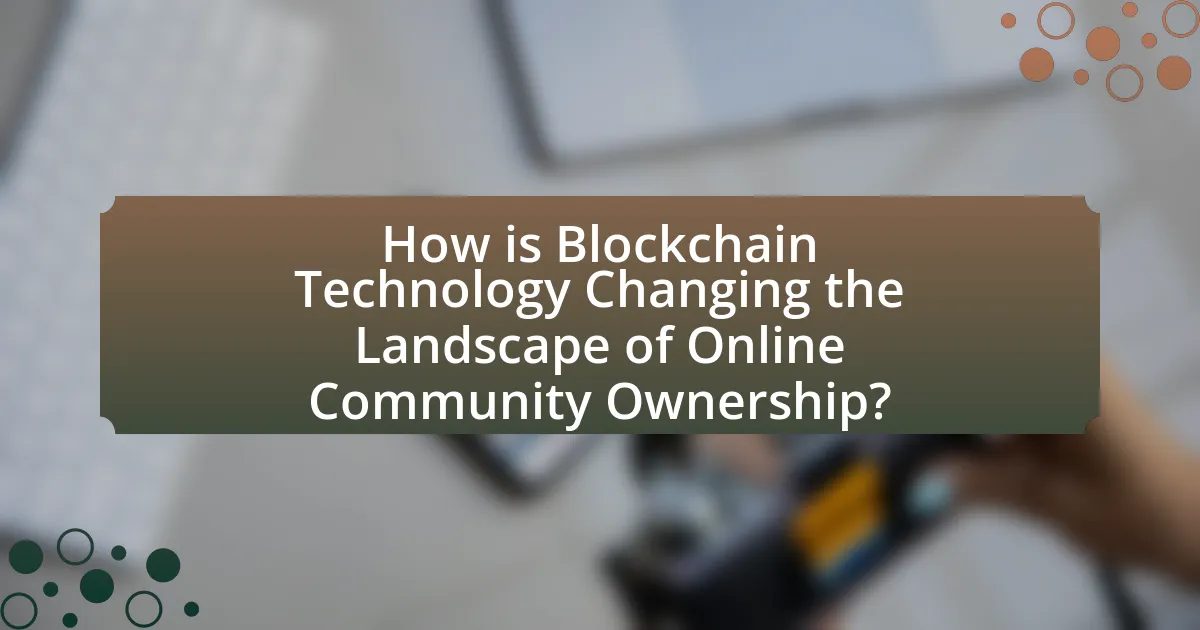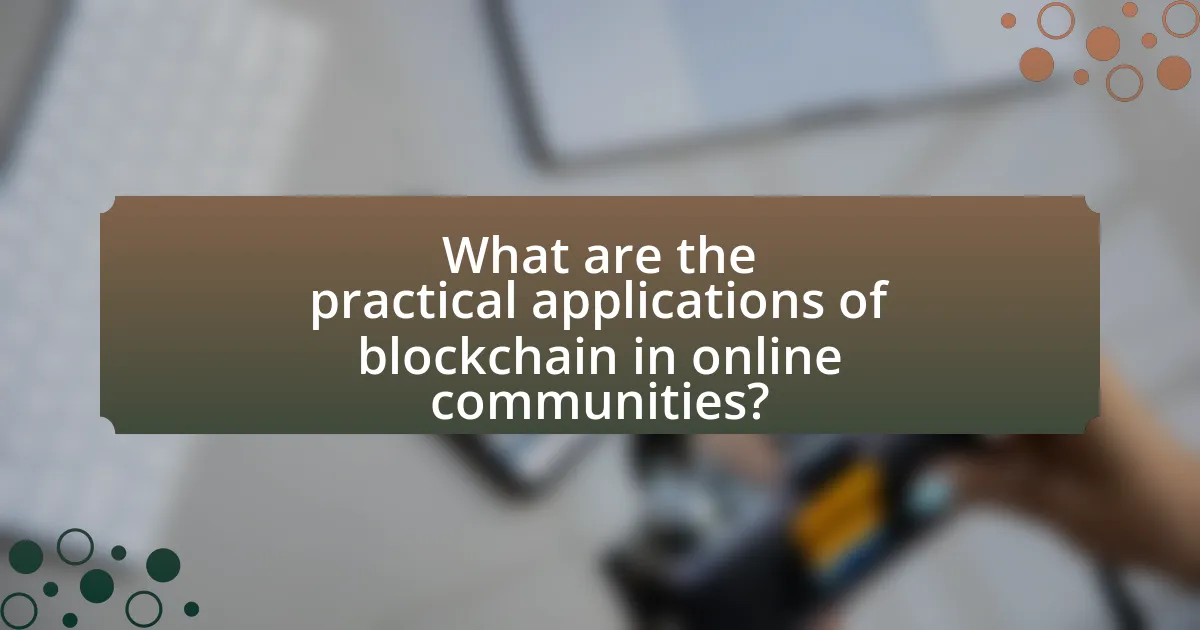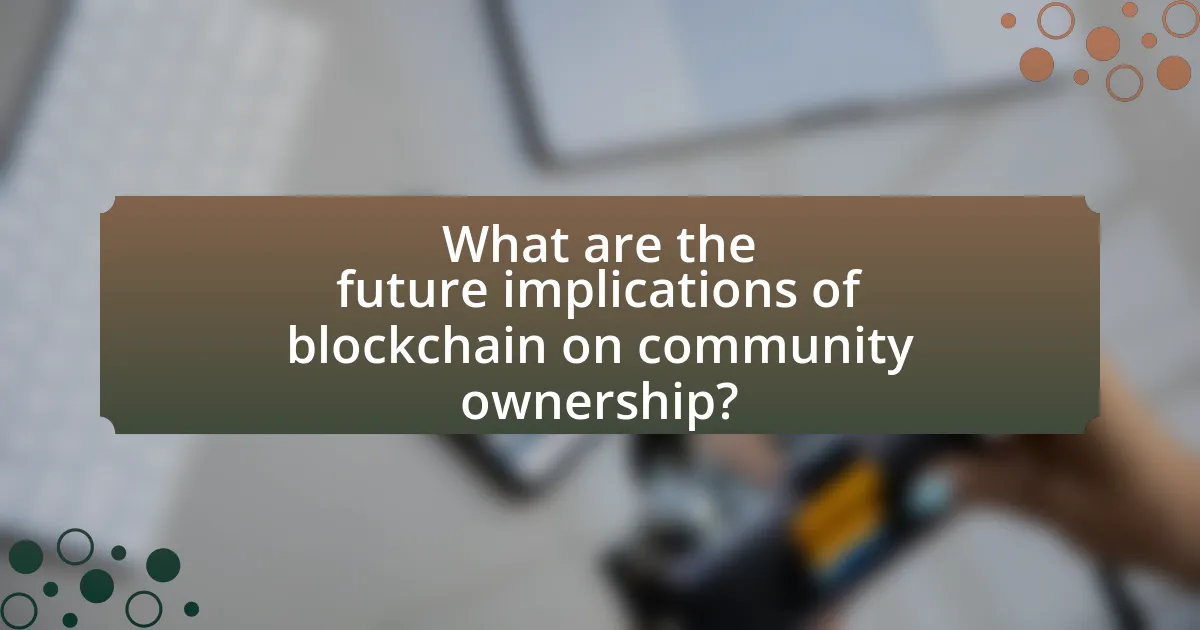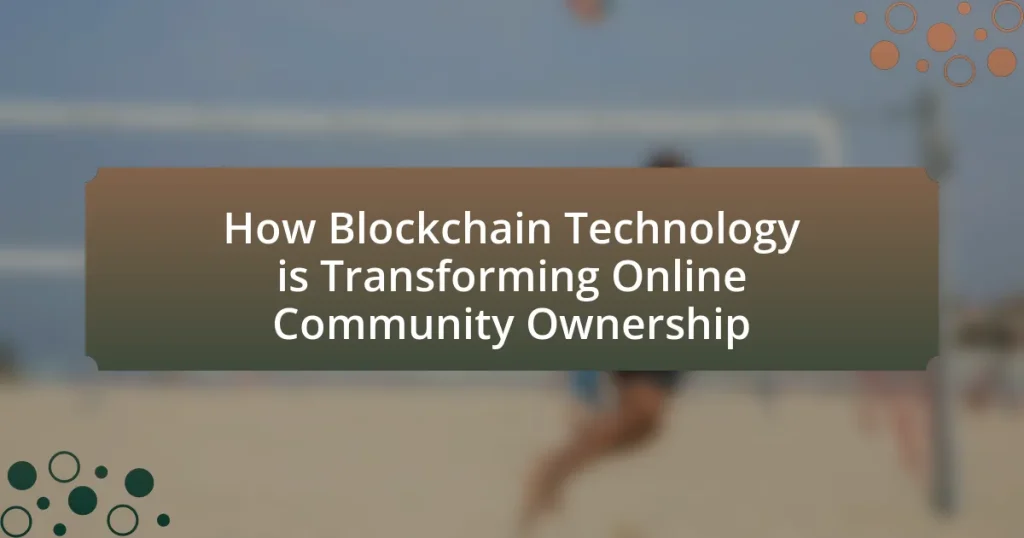Blockchain technology is fundamentally transforming online community ownership by enabling decentralized governance and transparent asset management. This shift empowers community members with direct control over their assets and decision-making processes, reducing reliance on centralized authorities. Key principles of blockchain, such as decentralization, transparency, immutability, and security, enhance trust and engagement within communities. The article explores the implications of blockchain for community ownership, including the role of decentralized autonomous organizations (DAOs), the impact of tokenomics on decision-making, and practical applications that enhance user participation and loyalty. Additionally, it addresses the challenges faced by traditional online communities and outlines best practices for adopting blockchain technology effectively.

How is Blockchain Technology Changing the Landscape of Online Community Ownership?
Blockchain technology is fundamentally altering online community ownership by enabling decentralized governance and transparent asset management. This shift allows community members to have direct control over their assets and decision-making processes, reducing reliance on centralized authorities. For instance, platforms like DAO (Decentralized Autonomous Organization) utilize smart contracts to facilitate collective decision-making, ensuring that all members can participate in governance without intermediaries. Additionally, blockchain’s immutable ledger provides a transparent record of ownership and transactions, fostering trust among community members. According to a report by Deloitte, 40% of organizations are exploring blockchain for its potential to enhance transparency and security in community-driven initiatives.
What are the fundamental principles of blockchain technology?
The fundamental principles of blockchain technology include decentralization, transparency, immutability, and security. Decentralization ensures that no single entity controls the entire network, allowing for distributed consensus among participants. Transparency allows all transactions to be visible to network participants, fostering trust. Immutability means that once data is recorded on the blockchain, it cannot be altered or deleted, ensuring the integrity of the information. Security is achieved through cryptographic techniques that protect data from unauthorized access and fraud. These principles collectively enable blockchain to facilitate trustless interactions and enhance ownership models in online communities.
How does decentralization play a role in community ownership?
Decentralization enhances community ownership by distributing control and decision-making power among community members rather than central authorities. This structure allows individuals to have a direct stake in the governance and management of resources, fostering a sense of belonging and responsibility. For instance, blockchain technology enables transparent and secure transactions, ensuring that community members can verify ownership and participate in decision-making processes without intermediaries. This shift from centralized control to decentralized governance has been shown to increase engagement and investment in community initiatives, as evidenced by projects like DAO (Decentralized Autonomous Organizations), which empower members to vote on proposals and allocate funds collectively.
What security features does blockchain provide for online communities?
Blockchain provides several security features for online communities, including decentralization, immutability, and cryptographic security. Decentralization ensures that no single entity controls the entire network, reducing the risk of data manipulation or censorship. Immutability guarantees that once data is recorded on the blockchain, it cannot be altered or deleted, which protects community records and transactions from fraud. Cryptographic security employs advanced encryption techniques to secure user identities and transactions, ensuring that sensitive information remains confidential and protected from unauthorized access. These features collectively enhance trust and security within online communities, making blockchain a robust solution for community ownership and governance.
Why is community ownership important in the digital age?
Community ownership is important in the digital age because it empowers individuals and groups to control their digital assets and data, fostering a sense of belonging and collaboration. This empowerment is crucial as it enables communities to create, manage, and benefit from their own digital resources without reliance on centralized entities. For instance, blockchain technology facilitates transparent and secure transactions, allowing communities to collectively own and govern digital platforms, thereby reducing the risk of exploitation by corporations. Research indicates that decentralized governance models, such as those enabled by blockchain, can enhance community engagement and trust, leading to more sustainable and resilient digital ecosystems.
How does community ownership empower users?
Community ownership empowers users by granting them control over decision-making processes and resource allocation within their communities. This empowerment fosters a sense of belonging and responsibility, as users can directly influence the direction and governance of their community initiatives. For instance, in blockchain-based platforms, users can participate in decentralized governance models, allowing them to vote on proposals and changes, which enhances transparency and accountability. Research indicates that communities with ownership structures see increased engagement and satisfaction among members, as they feel their contributions are valued and impactful.
What challenges do traditional online communities face regarding ownership?
Traditional online communities face significant challenges regarding ownership, primarily due to centralized control by platform providers. This centralization often leads to issues such as lack of user data ownership, where users have limited rights over their contributions and personal information. For instance, platforms like Facebook and Reddit retain the ability to modify or delete content, which undermines users’ sense of ownership and agency. Additionally, monetization practices often favor the platform over the community members, resulting in a disparity in profit-sharing and recognition. According to a 2021 report by the Pew Research Center, 64% of social media users expressed concerns about how their data is used, highlighting the widespread apprehension regarding ownership and control in traditional online communities.
How does blockchain facilitate new models of community governance?
Blockchain facilitates new models of community governance by enabling decentralized decision-making and transparent resource management. Through smart contracts, communities can automate governance processes, ensuring that rules are enforced without the need for intermediaries. This decentralization empowers members to participate directly in decision-making, as seen in decentralized autonomous organizations (DAOs), where voting power is distributed based on token ownership. Furthermore, blockchain’s immutable ledger provides a transparent record of all transactions and decisions, fostering trust among community members. For instance, platforms like Aragon and DAOstack exemplify how blockchain technology can create self-governing communities, allowing for collective ownership and management of resources.
What are decentralized autonomous organizations (DAOs) and their significance?
Decentralized autonomous organizations (DAOs) are blockchain-based entities governed by smart contracts, enabling collective decision-making without centralized control. Their significance lies in promoting transparency, democratizing governance, and facilitating trust among participants, as decisions are made through consensus mechanisms and recorded on an immutable ledger. For instance, the DAO that raised over $150 million in 2016 demonstrated the potential for community-driven funding and governance, highlighting how DAOs can empower individuals and reshape traditional organizational structures.
How can tokenomics influence community decision-making?
Tokenomics can significantly influence community decision-making by establishing a framework for governance and incentivizing participation. Through mechanisms such as voting rights tied to token ownership, community members can directly influence decisions regarding project direction, resource allocation, and policy changes. For instance, in decentralized autonomous organizations (DAOs), token holders often vote on proposals, ensuring that those with a financial stake in the community have a say in its governance. This model has been validated by successful DAOs like MakerDAO, where token-based voting has led to effective community-driven decisions, demonstrating that tokenomics not only empowers members but also aligns their interests with the community’s success.

What are the practical applications of blockchain in online communities?
Blockchain technology has several practical applications in online communities, primarily enhancing transparency, security, and user ownership. For instance, decentralized governance models allow community members to vote on decisions using smart contracts, ensuring that all voices are heard and reducing the risk of manipulation. Additionally, blockchain enables the creation of digital identities, which can enhance user verification and trust within the community. Furthermore, tokenization of community assets allows members to buy, sell, or trade their stakes in the community, fostering a sense of ownership and incentivizing participation. These applications are supported by real-world examples, such as the use of Ethereum-based tokens in decentralized autonomous organizations (DAOs), which have successfully implemented community-driven governance and funding models.
How are existing online communities integrating blockchain technology?
Existing online communities are integrating blockchain technology primarily through decentralized governance models and token-based economies. These communities utilize blockchain to enable transparent decision-making processes, allowing members to vote on proposals and changes using governance tokens. For instance, platforms like DAOstack and Aragon facilitate decentralized autonomous organizations (DAOs), where community members can propose and vote on initiatives, ensuring that all voices are heard and reducing central authority. Additionally, communities are implementing tokenomics to incentivize participation and reward contributions, as seen in projects like Gitcoin, which funds open-source development through community-driven grants. This integration not only enhances member engagement but also fosters a sense of ownership and accountability within the community.
What examples illustrate successful blockchain implementation in communities?
Successful blockchain implementation in communities is exemplified by initiatives like the City of Zug in Switzerland, known as “Crypto Valley,” which uses blockchain for secure digital identity and voting systems. Additionally, the platform Provenance enables consumers to trace the origins of products, fostering transparency in supply chains, which has been adopted by various local businesses. Another example is the use of blockchain in the social impact sector, such as the Giveth platform, which facilitates direct donations to projects, enhancing community engagement and trust. These implementations demonstrate how blockchain technology can enhance governance, transparency, and community participation.
How do these integrations enhance user engagement and loyalty?
Integrations of blockchain technology enhance user engagement and loyalty by providing transparent, secure, and decentralized platforms for community interactions. These features foster trust among users, as they can verify transactions and ownership without relying on a central authority. For instance, blockchain enables users to have true ownership of digital assets, which incentivizes participation and investment in the community. According to a report by Deloitte, 40% of organizations using blockchain technology have seen increased customer engagement due to enhanced trust and transparency. This trust leads to higher retention rates, as users feel more connected and valued within the community.
What types of online communities benefit most from blockchain technology?
Decentralized online communities benefit most from blockchain technology. These communities, such as cryptocurrency forums, decentralized finance (DeFi) platforms, and non-fungible token (NFT) marketplaces, leverage blockchain for enhanced security, transparency, and ownership. For instance, DeFi platforms allow users to engage in financial transactions without intermediaries, reducing costs and increasing accessibility. Additionally, NFT marketplaces enable artists and creators to maintain ownership of their digital assets, ensuring they receive fair compensation for their work. The use of smart contracts in these communities automates processes and enforces agreements, further solidifying the advantages of blockchain technology in fostering trust and collaboration among members.
How do gaming communities utilize blockchain for ownership?
Gaming communities utilize blockchain for ownership by enabling players to have verifiable and transferable ownership of in-game assets through non-fungible tokens (NFTs). This technology allows players to buy, sell, and trade unique digital items, such as skins, characters, and virtual real estate, on decentralized marketplaces. For instance, games like Axie Infinity and Decentraland have successfully implemented blockchain to grant players true ownership of their assets, which can be tracked and authenticated on the blockchain. This ownership model empowers players by providing them with the ability to monetize their gaming experiences, as evidenced by the billions of dollars generated in NFT sales within the gaming sector in recent years.
What role does blockchain play in social media platforms?
Blockchain plays a crucial role in social media platforms by enabling decentralized data management and enhancing user privacy. This technology allows users to own and control their data, reducing reliance on centralized entities that traditionally manage social media platforms. For instance, platforms like Steemit and Minds utilize blockchain to reward users for content creation and engagement, ensuring that users receive fair compensation for their contributions. Additionally, blockchain’s transparency and immutability help combat issues like misinformation and data manipulation, as all transactions and interactions are recorded on a public ledger. This shift towards decentralization not only empowers users but also fosters a more equitable online community ownership model.

What are the future implications of blockchain on community ownership?
Blockchain technology will significantly enhance community ownership by enabling decentralized governance and transparent asset management. This shift allows communities to collectively manage resources and make decisions without relying on centralized authorities. For instance, decentralized autonomous organizations (DAOs) utilize smart contracts to facilitate democratic voting processes, ensuring that all members have a voice in governance. Additionally, blockchain’s immutable ledger provides a transparent record of ownership and transactions, reducing disputes and fostering trust among community members. As communities adopt these technologies, they can create more equitable systems that empower individuals and promote shared responsibility.
How might blockchain technology evolve in the context of online communities?
Blockchain technology is likely to evolve in online communities by enhancing decentralization, transparency, and user ownership. As communities increasingly seek to empower their members, blockchain can facilitate decentralized governance models, allowing users to participate in decision-making processes through token-based voting systems. This shift can lead to greater accountability and trust among community members, as all transactions and governance actions are recorded on an immutable ledger. Furthermore, the integration of smart contracts can automate community operations, such as membership rewards and content monetization, thereby incentivizing participation and contribution. The rise of decentralized autonomous organizations (DAOs) exemplifies this evolution, as they enable communities to operate without centralized control, fostering a sense of shared ownership and responsibility.
What trends are emerging in community ownership models?
Emerging trends in community ownership models include increased decentralization, enhanced transparency, and the integration of blockchain technology. Decentralization allows communities to have greater control over their resources and decision-making processes, reducing reliance on centralized authorities. Enhanced transparency is achieved through blockchain, which provides immutable records of transactions and ownership, fostering trust among community members. Additionally, the rise of decentralized autonomous organizations (DAOs) exemplifies how blockchain facilitates collective governance, enabling members to participate in decision-making through token-based voting systems. These trends reflect a shift towards more democratic and participatory frameworks in community ownership.
How can communities prepare for future developments in blockchain technology?
Communities can prepare for future developments in blockchain technology by fostering education and awareness about its applications and implications. This involves organizing workshops, seminars, and discussions to inform members about blockchain’s potential to enhance transparency, security, and ownership in online communities. For instance, a survey by Deloitte found that 40% of organizations are exploring blockchain for its ability to improve trust and efficiency in transactions. Additionally, communities should consider forming partnerships with tech experts and blockchain developers to stay updated on innovations and best practices. Engaging in pilot projects can also help communities experiment with blockchain solutions, allowing them to assess benefits and challenges in real-world scenarios.
What best practices should communities follow when adopting blockchain technology?
Communities should prioritize transparency, security, and inclusivity when adopting blockchain technology. Transparency ensures that all stakeholders have access to information regarding transactions and governance, fostering trust. Security is critical, as blockchain’s decentralized nature protects against data breaches and fraud; for instance, the use of cryptographic techniques enhances data integrity. Inclusivity involves engaging diverse community members in decision-making processes, which can lead to more equitable outcomes. Research indicates that communities that implement these best practices are more likely to succeed in their blockchain initiatives, as evidenced by case studies from successful blockchain projects like Ethereum and Hyperledger, which emphasize these principles.
How can communities ensure security and transparency in their blockchain initiatives?
Communities can ensure security and transparency in their blockchain initiatives by implementing robust consensus mechanisms and utilizing smart contracts. Consensus mechanisms, such as Proof of Work or Proof of Stake, validate transactions and prevent malicious activities, thereby enhancing security. Smart contracts automate processes and enforce rules transparently, ensuring that all participants can verify actions without intermediaries. According to a study by the World Economic Forum, blockchain technology can reduce fraud and increase trust in digital transactions, highlighting its effectiveness in promoting security and transparency.
What strategies can enhance community participation in blockchain governance?
Strategies that can enhance community participation in blockchain governance include implementing transparent decision-making processes, utilizing incentive mechanisms, and fostering educational initiatives. Transparent decision-making allows community members to understand governance structures and participate meaningfully, as seen in projects like Aragon, which emphasizes clarity in governance protocols. Incentive mechanisms, such as token rewards for participation, encourage active involvement; for instance, platforms like DAOstack reward users for contributing to governance proposals. Educational initiatives, including workshops and online resources, empower community members with the knowledge needed to engage effectively, as demonstrated by initiatives from the Ethereum Foundation that aim to educate users about blockchain governance. These strategies collectively promote a more engaged and informed community in blockchain governance.
